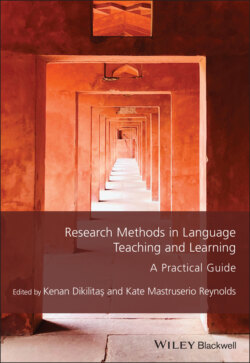Читать книгу Research Methods in Language Teaching and Learning - Группа авторов - Страница 49
Making Methodological Choices
ОглавлениеWhen I informed my supervisors about my concerns regarding the situation in ELT in Turkey, they suggested conducting an action research study since my concern was in line with the general objective of action research – to improve classroom practice (Kemmis, 2009; Kemmis & McTaggart, 1988; McKay, 2006). Action research is defined as “the study of a social situation with a view to improving the quality of action within it” (Elliott, 1991, p. 69). Echoing this, Kemmis (2009) terms action research as “practice-changing practice” ( p. 464). It allows the researcher to carry out a systematic study to act and reflect on a problem that impedes the effectiveness of classroom teaching (Burns, 2010a; Ebbutt, 1985). The problem in my context was obviously a lack of effective speaking classes at different times that promoted students’ EFL engagement in speaking activities. Action research made it possible to take systematic steps to understand, evaluate and improve classroom practice in an EFL speaking setting (Bassey, 1998; Frost, 2002; McKay, 2006).
Considering that external agents may not know the situation of the class, action research studies are carried out with the involvement and collaboration of the teacher (Hammersley, 2004; Nunan, 1992). I was fortunate in that one of my colleagues in the ELT department at a university agreed to take part in my study. She was the lecturer of the Oral Communication Skills course that is offered to first-year university students at the department. This therefore made it possible for me to conduct the study in a real EFL speaking class.
After reaching a consensus on implementing action research methodology, my supervisors and I discussed which action research model to follow. In doing so, we considered whether the model would allow for the implementation of grounded theory and decided to adapt Elliott’s (1991) and Kemmis and McTaggart’s (1988) models. The reconnaissance phases (i.e., fact finding) included in Elliott’s model seemed an appropriate step to develop theoretical understanding of classroom context and uncover instructional problems before taking actions. Therefore, we decided to include a 4-week reconnaissance phase, in which I would observe classes and collect data from the teacher and students to become familiar with the research context.
We used Kemmis and McTaggart’s (1988) model in our weekly based interventions, because the model paralleled the principles of grounded theory in terms of designing research interventions based on the interpretations of the data. I conducted eight interventions, in which student negotiation was implemented by following planning, acting, observing, and reflecting stages of the model.
The final week of the research was critical, because it generated the outcomes of grounded theory by means of drawing conclusions and developing a new theoretical hypothesis based on the data collected throughout the term. To do this, I collected data from the teacher and students using different data collection methods in order to understand their perspectives of the effectiveness of implementing student negotiation in EFL speaking classes, and this allowed me to develop a new idea about the effectiveness of student negotiation in increasing student engagement in EFL speaking activities. These procedures led to a three-stage action research approach: reconnaissance phase (Stage 1), student negotiation (Stage 2), and developing a new idea (Stage 3).
